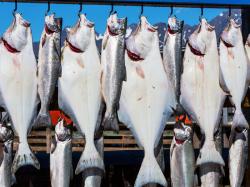Artic Greenland Halibut Certified As Sustainable
November 1, 2017 | 2 min to read

Greenland’s halibut has been MSC certified as a sustainable and well-managed fishery. In Europe, the main market is in France but it is exported across the EU, including the UK.
However, the main markets for the Greenland halibut are in the Far East with more than half of the total catch going to Japan, China, Hong Kong and Vietnam. The Greenland halibut is popular raw in sushi and sashimi but also a good fish to smoke or marinate, since it absorbs the ingredients of the marinade. It is very rich in omega-3 fatty acids.
European retailer initially asked the Greenland industry to get MSC certification on the fishery which became the first MSC certificate for that specie. The fishery client in Iceland put all commercial species in Iceland which had not been already certified into Pre-assessment. Greenland halibut were one of the species there and were brought forward into full assessment and now with successful completion.
About Greenland halibut
Greenland halibut (Reinhardtius hippoglossoides) lives in the arctic polar sea, and can grow up to 1.2 metres long. It has a meaty white flesh and it is often served as steaks or fillets. Also known as Greenland turbot it belongs to the family of right eye flounders that can swim both flat and upright. Halibut live all-round the north pole in deep waters from 200 to 1600m but they have been caught at depths more than 2,200 m.
Leadership by the industry
Kristinn Hjálmarsson, The Project manager at ISF says: “Greenland halibut is an arctic species living in Polar sea of the East Greenland current. This is the second flatfish fishery which ISF has certified, with the first one being plaice. The fishery completed assessment in the Icelandic economic zone but ISF need to do further work to complete the certification of the component of the fishery which takes place in east Greenland economic zone.”
Gísli Gíslason, Senior Program Manager for Iceland, Faroe and Greenland, says: “This is the second certification of Greenland halibut for the MSC standard after West Greenland successfully completed their assessment. Around 75% of the product caught are exported to Asia. MSC engagement in Asia, in China and Japan, is successfully growing and I do believe the product from this fishery will fit nicely into that portfolio.”
About Iceland Sustainable Fisheries
Iceland is pursuing MSC certification for its fisheries through a unique arrangement: The client group is Iceland Sustainable Fisheries (ISF). The group was founded in 2012 by companies engaged mainly export sales companies of Icelandic fish products. Products that originate from one of ISF certified fisheries need to be sold through one of the ISF members to become eligible to carry the MSC logo and sold as MSC certified.
ISF has currently 55 members who are involved in catching, processing and sales, all the activities carry out by the client group may be consulted in the ISF website (www.icelandsustainable.is) with a clear report of how it develops them and information regarding each company involved.
Source: Marine Stewardship Council (MSC)
